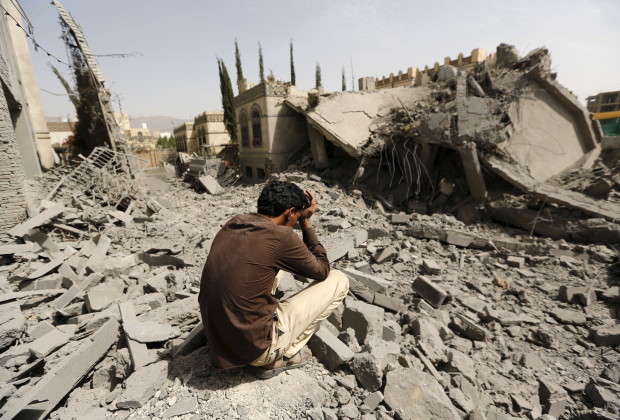
Since taking office, Trump has rapidly expanded U.S. military operations in Yemen. Last month, the U.S. reportedly launched more than 49 strikes across the country—more strikes than the U.S. has ever carried out in a single year in Yemen. The U.S. has also resumed some weapons sales to the Saudis, after the transfers were frozen by President Obama amid concerns about mounting civilian casualties in Yemen. For more, [Amy Goodman spoke] with longtime investigative reporter Allan Nairn
Well, first, the particulars of that attack, that attack [U.S. Navy SEAL strike in Yemen.in which some 25 civilians were killed, many of them children] was aimed to be targeting al-Qaeda, a local al-Qaeda affiliate. It’s worth noting that in Syria many of the rebels, who the U.S. has been backing and arming and training, often conduct joint operations with al-Nusra, the al-Qaeda affiliate in Syria. And, indeed, a good number of them have joined up with al-Nusra. But on this raid, it took place in a context of a broader war and a broader assault, which on—on Yemen, on the Houthi armed rebel movement in Yemen, by Saudi Arabia. And in these raids, the Saudis are using U.S. planes. They’re using U.S. bombs. There are actually U.S. personnel sitting in the Saudi Air Force headquarters, helping them with targeting. And the Saudis are systematically targeting Yemeni civilians. After one particularly egregious and especially widely reported massacre on a funeral gathering, the U.S. admonished the Saudis. They criticized them. They temporarily froze and pulled back a bit of their aid. But now, under Trump, again, it’s full speed ahead with assaults on civilian targets by the Saudis in—in Yemen.
And if you look at the press, including outlets like MSNBC, various press outlets that are considered to be liberal, one of the main arguments they make is that a U.S. action is good when it pleases the Saudis. They always—there’s this constant line of criticism, which has been going on for decades, criticism against U.S. presidents who are considered to be too soft at a given moment. And that criticism is: You’re letting down our Middle Eastern allies, i.e. you’re letting down the Saudis. The journalists will say, "I’ve just been in the Middle East, and I’ve been talking to our allies there," i.e. the Saudis, the Gulf states, "and they’re very unhappy, because they think the U.S. is not showing enough credibility. We’re letting them down"—i.e. the U.S. isn’t being violent enough. And that’s the context in which this attack on Yemen by the Special Forces took place.
As to why Trump authorized it in that way, I think a very important motivating factor, that is really underestimated by people, especially scholars, is the extent to which, when you have power, when you’re the king, a lot of the motivation for violence, for war, it’s not just interest. A lot of the motivation is fun, is thrill, is getting a charge out of ordering violence, and thrilling the public, exciting the courtiers around you, exciting the press around you. The recent reaction to the Syria attack is a very good example of that. I think to really understand how big powers operate, when it comes to going out and killing people, I mean, don’t just study their concrete interests, like, you know, mineral exports and geopolitics. Also study Shakespeare. Study the the whims of kings, because that’s what a lot of it is about. And if you look back at the debates in the campaign between Clinton and Trump, when they were talking about the violent system, they they did not disagree at all about the U.S. right to commit aggression, about the U.S. right to kill civilians. What they did disagree about was how those decisions would be made. Clinton invoked the traditional establishment criteria that I discussed before of, yes, you can bomb, but you can only kill up to 25 civilians with your bombing run. Trump invoked a different standard, saying, "I’ll attack whenever the hell I feel like it." Both of them allow the killing of civilians, which is a crime.
(From an Amy Goodman interview on DemocracyNow! with Alan Nairn, 4/12/17)
